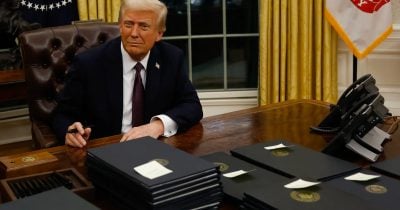The White House group is expected to clarify stablecoin rules, resolve agency overlaps, and protect consumers in the digital asset landscape.

Photo: Anna Moneymaker
Key Takeaways
- Trump's Working Group on Digital Asset Markets must submit federal crypto policy proposals by July 22.
- The proposals will address stablecoins, market oversight, consumer protection, and establish clear federal regulatory jurisdiction.
President Donald Trump’s Working Group on Digital Asset Markets has until July 22 to submit its final report on a proposed federal framework for the regulation of digital assets, including stablecoins, market oversight, and consumer protection, according to a January 23 executive order establishing the group.
The report will also evaluate the feasibility of a national digital asset stockpile, though a separate executive order has already established the framework for its creation.
“Within 180 days of the date of this order, the Working Group shall submit a report to the President, through the APEP, which shall recommend regulatory and legislative proposals that advance the policies established in this order,” the order reads.
The EO was issued before President Trump signed a separate executive order in early March establishing a strategic Bitcoin reserve and digital asset stockpile. Under that second crypto-focused directive, all federal agencies were required to report their Bitcoin and crypto holdings to Treasury Secretary Scott Bessent by April 7.
The President’s Working Group on Digital Asset Markets, to be housed within the National Economic Council, is led by David Sacks, the White House’s AI and crypto czar, with participation from leaders from key agencies, including the Treasury Department, Justice Department, SEC, and CFTC.
Bo Hines, Executive Director of the Presidential Council of Advisors for Digital Assets, a group chaired by Sacks, said last month that the administration may release a Treasury Department report detailing US government Bitcoin holdings, even though it’s not required to do so. Hines plays a key role in shaping digital asset policy within the Trump administration.
The working group’s primary responsibility is to propose a regulatory framework governing the issuance and operation of digital assets, with a particular focus on stablecoins.
According to the January order, the final report must address market structure, oversight, consumer protection, and risk management. It is also expected to resolve long-standing jurisdictional ambiguities between federal regulators, such as the SEC and CFTC.
The report may also influence how federal banking regulators approach crypto custody, on/off ramps, and integration with the traditional financial system.
The EO also explicitly bars federal agencies from developing or implementing CBDC initiatives, stating that they “threaten the stability of the financial system, individual privacy, and the sovereignty of the United States.”
Disclaimer
 8 hours ago
1
8 hours ago
1















![11 Best Crypto & Bitcoin Casinos in Australia [2025]](https://coincheckup.com/blog/wp-content/uploads/best-crypto-and-bitcoin-casinos-in-australia-coincheckup-1024x576.png)
 English (US) ·
English (US) ·